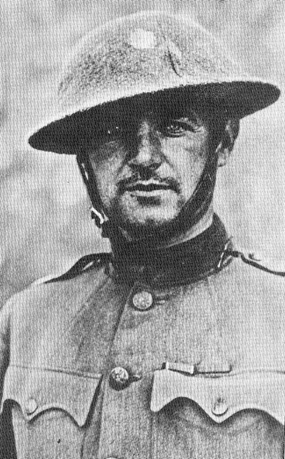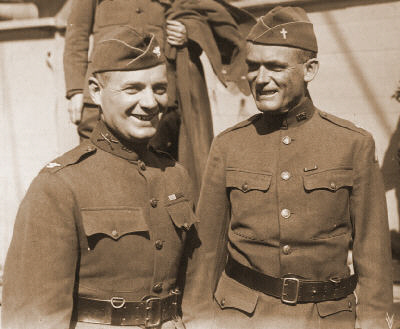
At the 11th hour of the 11th day of the 11th month of 1918, for the first time in over four years, the guns fell silent across the trenches that scarred the face of Europe during the First World War. America had been latecomers to the conflict but at a tremendous cost had tipped the scales in what had been a murderous stalemate. No division had sacrificed more than the 42nd Division, nicknamed the “Rainbow Division,” as it had been formed from National Guard Units whose origins stretched across the country. No unit in the Rainbow Division fought on more fronts, nor suffered more casualties, than the regiment that represented the green in that rainbow: the 165th, the federal number assigned to the 69th New York. It was the same New York 69th that fifty years earlier, as a unit of the Irish Brigade, had been given the nickname of “the fighting 69th” as a tribute of respect by an enemy commander, Robert E. Lee. While the regimental number had changed, the unit and the New York Irish would once again prove worthy of that title, and no one was more responsible for the regiments unequaled record in WW I than Col. William “Wild Bill” Donovan.
Even before the war, William Joseph Donovan was a hero of Horatio Alger proportions. The grandson of immigrants from Skibbereen, Co Cork, he had literally been born on the wrong side of the tracks in Buffalo, New York. Yet, as typical of Irish immigrants, each generation was climbing the American dream’s long ladder. While Donovan’s grandfather had worked shoveling grain in the holds of ships, his father had risen to the influential position of yardmaster for the local railroad. Young William Donovan continued the trend, attending Columbia University, where he would earn a law degree. Donovan was a star quarterback of the Columbia football team in an age where amateur athletes were treated like today’s professional superstars. It was here he earned the nickname “Wild Bill Donovan.” He returned to Buffalo, started a law practice, and married the daughter of the wealthiest man in Buffalo.

Yet, Donovan was not a man to rest on his success; his strong sense of duty and patriotism called him to seek an opportunity to serve his country. With several friends, Donovan formed a National Guard company of cavalry that served when the Army was mobilized to hunt for Pancho Villa. When the United States entered World War I, Donovan was called back to service and assigned as a Major to the 165th regiment, the number given to the rechristened N.Y. 69th which had won glory in the American Civil War as part of the “Irish Brigade”. He was a popular choice with the mostly Irish American regiment, particularly their Chaplin, Fr. Francis Duffy , who himself would win fame and honor with the regiment. Donovan applied the same tough discipline to his men’s training as he had experienced himself as an athlete on the playing field of Columbia, training his men would come to appreciate on the battlefields of France.
In France, at the river Ourcq, nicknamed by the Irish of the 165th “the O’Rourke,” the 42nd Division was ordered to cross the river and secure a ridge and farm on the other side. The position was believed to be “lightly held” when in fact they were being faced by three German Divisions, including one of elite Prussian Guards. Only Donovan’s 165th managed to reach its objective, the units on the left and right having been pushed back. The result was the 165th was cut off and subjected to machine gun and artillery fire on three sides. It was estimated that the Germans had one machine gun for four of Donovan’s men. Donovan and his men held their position for three days until the rest of the Division could reinforce the 165th but at a terrible cost: of the 3,000 men who entered the battle, 1,750 men and 66 officers were lost. Donovan himself was exposed to poison gas and wounded, yet still continued to lead his men. In one case, Donovan, without regard to danger, crossed open ground under heavy enemy fire to communicate coordinates for support artillery. For this action, Donovan was awarded the Distinguished Service Cross and promoted Lt. Colonel.
Tragically, these circumstances repeated themselves only a few months later when the 165th was again asked to breach a line of German fortifications. Again, the 165th was going up against some of Germany’s best troops, not with the battle-hardened men they had lost at the Ourcq, but young and inexperienced replacements. Describing it as “foolish but necessary” to his wife in a letter written before the battle, Donovan put on his full regulation uniform and insignia. He knew that he would be a target for German snipers by so obviously identifying himself as a senior officer, but he also knew that his raw men needed to see him out in front. During the German attack, Donovan was severely wounded but continued to encourage his men and refused all attempts to evacuate him till the battle was over. For his actions, Donovan was awarded the Medal of Honor and became the most decorated soldier of WW I.
“They’re not going to see your faces, but they will never forget what you looked like.”
William Donovan
On arriving back in New York, Donovan and his men were honored with a parade down 5th Avenue and, appropriate for the men of the 69th/165th, past St. Patrick’s Cathedral. Donovan ordered his men to march wearing their steel helmets, ammunition boots with their weapons, rather than dress uniforms, saying, “They’re not going to see your faces, but they will never forget what you looked like.” Donovan himself elected to march with his men rather than ride the traditional horse. The regiment marched to the strains of the regimental march “Garryowen” to City Hall, where they were presented with “the freedom of the City.” Later that night in camp, Donovan heard some of his men singing “The Good Old Summer Time,” a tune which many of his men now buried in France, sang as they went up to the line for their first battle. Donovan wept.
Despite having already accomplished enough to fill multiple lifetimes, history was still not done with “Wild Bill” Donovan. He would become a successful lawyer, federal prosecutor, and a confidant to Presidents for his clear and pragmatic thinking. In the inter-war years, Donovan was often used as a presidential agent, especially when it came to foreign intelligence matters. In World War II, Donovan created the Office of Strategic Services, the O.S.S., the precursor to today’s C.I.A., and attained the rank of Major General. After the war, he would assist in prosecuting Nazi war criminals at Nuremberg.
Little wonder that when informed that William Donovan had died peacefully after a life of honor and service to his country, then-President Eisenhower remarked, “What a man! We have lost the last hero.”
Neil F. Cosgrove ©